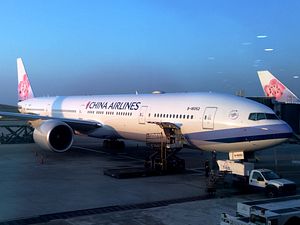Taiwan’s legislature on Wednesday passed two proposals that could see the flagship carrier China Airlines be renamed and the word “Taiwan” highlighted on the country’s passports.
The resolutions do not mandate any immediate changes but ask the executive branch to emphasize the word “Taiwan,” part of an effort by the ruling Democratic Progressive Party (DPP) and “pan-green” affiliated parties to move away from Taiwan’s official name, the Republic of China (ROC).
The resolutions both passed by unanimous votes as they were boycotted by legislators from the opposition Kuomintang (KMT), whose caucus whip criticized them as political theater.
Renaming China Airlines has long been a popular move within the DPP and among pan-green political forces. Wednesday’s approved proposal calls on Taiwan’s transportation ministry to “study and propose a feasible plan for the renaming of China Airlines in phases.”
In Wednesday’s legislative meeting, it was noted that the name is often confused with the Beijing-based Air China. Taiwan often uses China Airlines cargo flights to deliver mask and personal protective equipment (PPE) donations to other countries during the COVID-19 pandemic, leading people to believe the supplies came from China and complicating Taiwan’s efforts to brand itself and grow its global identity.
The proposal calls on Taiwan’s transportation ministry to emphasize the image of Taiwan on the livery of China Airlines planes without doing anything that would require its international aviation status to be re-negotiated.
But any move to remove “China” from the airline’s name is sure to anger officials in Beijing, who will see it as a step toward formal independence.
In 2003, Taiwan under then-President Chen Shui-bian urged some Taiwan-based companies to remove “China” from their names. When China Airlines added the word “Taiwan” to one of its 747s, Beijing urged countries not to allow the aircraft to land, and the word was soon painted over.
China has since exerted additional pressure to limit Taiwan’s status in the global aviation industry.
In 2018, Beijing forced global airlines to remove references to “Taiwan” as a separate country from their websites, a move which the White House called “Orwellian nonsense.”
The International Civil Aviation Organization (ICAO) in January came under fire for blocking numerous Twitter accounts criticizing its decision to classify Taiwan as a province of China.
Should China Airlines be renamed in the future, it will likely adopt a politically neutral moniker, despite calls from pro-independence groups to name the flag carrier “Formosa Airlines,” using a former name for the island of Taiwan.
A China Airlines official told CNN Travel that the airline “has no comments on this topic at the moment.”
The second proposal calls for passports to more prominently display references to “Taiwan” on passports in both Chinese characters and English. The country’s passports currently display “Republic of China” at the top and “Taiwan” at the bottom. The word “Taiwan” was added in 2003.
Cabinet spokesman Ting Yi-ming said a task force would discuss possible alterations to passports, including potentially increasing the size of the “Taiwan” reference or changing its position.
The resolution notes that Taiwan nationals have been subjected to discrimination abroad by people who believe they are from China and are critical of that country’s role in failing to prevent the global spread of COVID-19.
It’s also not the first time frustrated Taiwanese travelers have sought to alter their passports.
In 2015, some citizens began covering the words “Republic of China” with stickers reading “Republic of Taiwan.” This had generally poor results: Singapore deported three Taiwan nationals in November 2015 for “altering their travel documents,” although two immediately removed the stickers, and the United States warned that travelers using the stickers could be denied entry.
Taiwan under President Tsai Ing-wen has previously made efforts to change the branding of “Republic of China” or “Taipei” diplomatic missions and emphasize references to “Taiwan,” despite not being able to officially rename the representative offices.
Taiwan did take an unusually bold step earlier this month by establishing a “Taiwan representative office” in the unrecognized state of Somaliland, the first diplomatic outpost that will officially carry the name “Taiwan” rather than “Republic of China.”

































